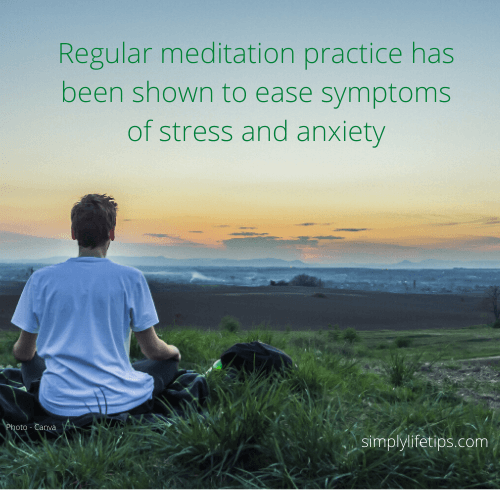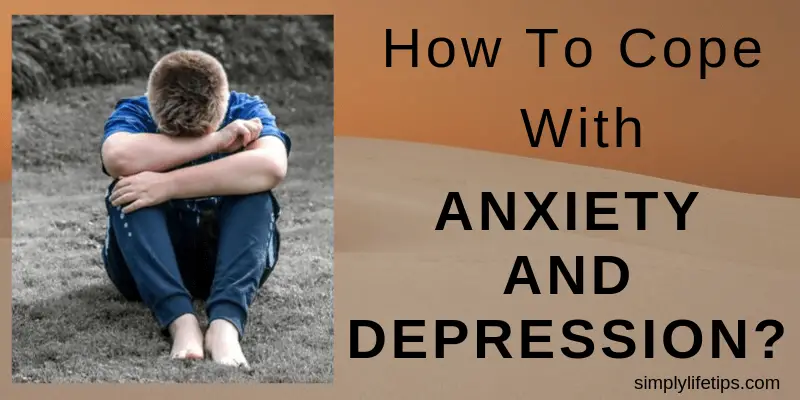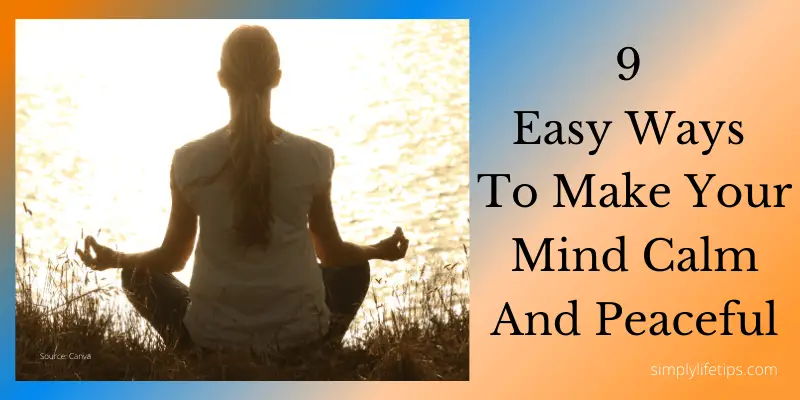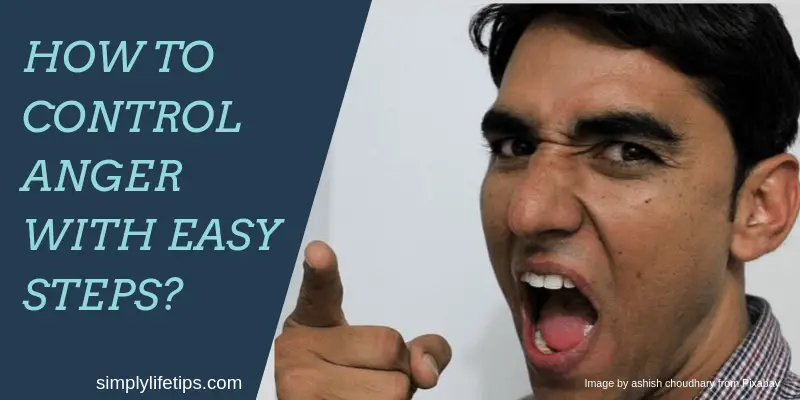Do you have anxiety or depression problems? Are you searching for how to cope with anxiety and depression? If yes, this post is for you.
What is Depression?
Depression and anxiety usually go hand-in-hand. Everybody deals with these conditions to some degree throughout their lives. However, if your symptoms are severe enough to be interfering with your ability to function normally on a daily basis, then it’s important that you find a treatment. If your anxiety and depression are intense enough that you have to alter your daily activities a great deal, you should seek professional help. If your anxiety and depression are milder, there are many things you can do to learn to cope with anxiety and depression.

Part 1 – Making Lifestyle Changes
1. Exercise regularly. Not only does regular exercise reduce the likelihood of heart disease and other illnesses, it has also been shown to treat both depression and anxiety. There are various explanations for why this occurs. First, exercise releases endorphins, a feel-good chemical in the brain that improves mood. It also reduces certain immune system chemicals that cause depression and raises the body temperature, which promotes relaxation.
- Regular exercise also helps you get in shape and improve your overall appearance, which for many people, is enough to rid them of their self-doubt.
- Endorphins help to inhibit your body’s stress response, which lowers your risk of feeling anxious or developing symptoms of panic throughout the day.
- Some studies show that exercise helps to alleviate symptoms of depression and anxiety just as well as medication. Even just 10 minutes of physical exercise can help alleviate anxiety and depression symptoms as much as a 45-minute workout.
- Exercise can lower your baseline anxiety or the level of tension or anxiety you experience daily. If you experience a high level of anxiety symptoms daily, exercise can decrease the number or severity of these symptoms that you experience.

Benefits of Exercise
- Importance Of Exercise | The 7 Top Excuses For Not Exercising Enough
- How To Manage Workplace Stress With Physical Exercises?
- If You Walk Every Day What Will Happen To Your Body?
- How To Overcome Self-Doubt In 5 Seconds? | Mel Robbins
2. Cut down on alcohol. People who suffer from anxiety tend to turn to alcohol to ease their tension and nervousness. Though alcohol may ease symptoms temporarily, it will actually make them worse in the long run. According to the Dietary Guidelines of America, if you are female, you should have no more than one drink per day. If you are a male, you should do no more than two per day. Because alcohol is a depressant, it temporarily suppresses your feelings of anxiety or tension, however, when the alcohol is metabolized and rids the body, your anxiety and depression will rebound.
- Similar to a spring that has to be pressed down harder and harder, your emotions are held down even more by the alcohol. Once the alcohol is gone, the spring will jump even high than it is when it’s just sitting there. This rebound means that you will likely experience more anxiety the next day, or be more susceptible to stress.

Addiction recovery
3. Switch to decaf. The high levels of caffeine that are present in coffee can worsen anxiety symptoms in both the short and long run. Caffeine is a stimulant which makes your body and nervous system wired and alert, which increases your risk of worsening or developing depression and anxiety throughout the day.
- By limiting your caffeine intake, you can help control your body’s physical response and prevent experiencing anxiety symptoms throughout the day. Consider switching to decaf, or drinking tea instead.
- Some tea, such as green tea, still contains some caffeine, but won’t have the same extreme effects as coffee.
4. Reduce or eliminate nicotine. Nicotine, much like caffeine, is a stimulant and can produce many of the same effects on the body associated with other stimulants, such as feeling wired. Nicotine is in tobacco products and is also in non-tobacco products such as nicotine gum.
- Realize that quitting smoking is a difficult task and should only be taken on during non-stressful times. However, doing so could greatly reduce your symptoms of anxiety and depression.
5. Structure your day. Depression is a painful experience which affects your mood, but also energy and motivation. If you are depressed, it may be difficult to focus or you may be tempted to stay in bed all day. You may be anxious if you don’t know how your day will go. Try to continue your regular routines as much as possible, and avoid letting your moods dictate what you do and what you get done.
- If you normally don’t have much structure, it may benefit you to begin to structure your days. Plan out your days, making sure they are full but not overwhelming and stick to the schedule so you can continue to function in your daily life.
Part 2 – Shifting Your Perspective
1. Learn to live in the present moment. If you are suffering from anxiety, it may be because you are worried, uncertain, or nervous about the future. If you are suffering from depression, it may be because you are constantly dwelling on the past, ruminating about things gone wrong, or thinking self-defeating thoughts. Learning to appreciate the present moment will have a remarkable impact on your life. However, this is no easy feat, but it will help you to separate your feelings from your thoughts.
- The best way to stop dwelling on the past or obsessing over the future is to notice when these kinds of thoughts arise throughout your daily life. When they do, then acknowledge them, label them thoughts, and let them fade away.
- Try to focus on what is happening around you and what your activities entail. Take stock of the people around you and how you feel performing whatever activity you are taking part in. It will help you come out of the past and focus on the present. Keep trying and you’ll get to a state of mindfulness.
2. Meditate. Regular meditation practice has been shown to ease symptoms of stress and anxiety. Mindfulness can also help you feel more connected to other, it can help you gain more control over your emotions, and increase your ability to think about situations in a new light. Consider joining a meditation centre or group in your area. Most centres offer free meditation instruction and have weekly open houses.
- To practice mindfulness and meditate, take a few moments every day to close your eyes, relax your muscles, and focus all of your attention on your breath. If a thought arises, then acknowledge it and let it disappear. The more you do this, the more you will eventually be able to incorporate it into your daily life.

3. Quiet your inner critic. Your inner critic is self-defeating or exaggerated thoughts that keep your feelings of depression and anxiety at large. Your inner critic may say things like “I’m a failure” or “There is nothing I can do, and I’m stuck.” Your inner critic may also latch onto one of your worries or thoughts that cause anxiety and then cause a snowball effect of more and more worrisome thoughts. Thoughts such as these keep you from being able to see choices in your life, make you feel incapable or stuck, or perpetuate worries, depression, or anxiety.
- Learn to quiet your inner critic to lessen the effect it has on your perspective and your mood. To quiet your inner critic, practice catching your unproductive thoughts as they come up, and be prepared with a productive counter-thought or mantra that focuses on your strengths.
- If you think “There is nothing I can do, I am stuck” Test if that is true. Make a list of all your possible options. Change your inner critic to say “Although my options are not the best, I do have a choice, and I choose_________ because….”
- If you have a thought that pops into your head that triggers a worry, fear, or other anxiety symptoms, be sure to counter your inner critic with a reassuring statement or phrase such as “I know the likelihood of that happening is very low, so I have nothing to worry about” or “Everything is going to be ok, I am fine at this moment and this feeling will pass.”
4. Cope with painful memories. Many people are depressed or anxious because they are holding on to one or more traumatic experiences from the past, and they are going through a significant change, or have lost a loved one. While it is extremely difficult to erase these memories and go through these experiences, there are things you can do to reduce their prevalence in your everyday life.
- Grieve when you need to. If you feel the need to cry or scream, then do it. Catharsis is a necessary part of the healing process. You can even look for grief groups in your area for support through your time of grief. If you are grieving, remember that it is a normal process with many emotions involved. You may not feel like yourself sometimes. However, if you continue to feel symptoms of grief long after losing your loved one, you should contact a therapist or mental health professional.
- Write out what happened and how it made you feel. There are many feelings involved with traumatic events that often need to be expressed. Many times, traumatic events will get compartmentalized and any feelings associated with the event will get pushed aside. Instead of doing this, which can lead to anxiety and depression, write down exactly what happened in as vivid detail as possible. Write down what you felt and what you still feel about the event. This will help you cope and move on.
- Get your thoughts out. When you are having issues with depression and anxiety or you are trying to get over past trauma, describe what happened and how it made you feel. You can do this by journaling or speaking with someone you trust. Getting it out is better than repressing it. Also, think about the contextual aspects of the traumatic event. Remembering other aspects of the day the event happened, such as the weather or who else was there, can help you dissolve some of the negative associations.
- If you are dealing with memories of a traumatic past, it is essential that you seek professional help to deal with the painful emotions caused by trauma.
Part 3 – Coping in the Moment
1. Cope with anxiety and depression at the moment. Anxiety can be a gripping experience and can make you feel as though you are losing control. There are some techniques you can try to get your body and mind to slow and calm. Depression symptoms have a wide range and differ depending on the type of depression you have. For some, feel overwhelmingly sad while others feel nothing at all and just feel numb. Still, others can have sudden bouts of irritability.
2. Try progressive muscle relaxation. Progressive muscle relaxation is a method that helps to physically reduce the tension in your muscles, which signals the brain to begin calming down. In a serial fashion, contract, hold and then release muscle groups of the body. Work from head to toe, and be sure to focus on the sensations you feel when you release the contraction and feel your muscle tension reducing.
- Beginning with your facial muscles, tighten the muscles for six seconds and then release them for six seconds. Repeat this down your body with your neck, chest, arms, hands, legs, calves, and feet.
3. Practice diaphragm breathing. Controlled breathing, or diaphragm breathing, is another way to signal your body to begin relaxing and start to calm its stress response, which is often anxiety. Controlled breathing signals your brain to release neurotransmitters, which tells your body that it is no longer in danger and can calm down. Practice diaphragm breathing by taking a full breath making your abdomen expand, hold it, and then release.
- The timing for this should be five seconds breathing in, holding for five seconds, and then breathing out for five seconds. Take two normal breaths, then repeat the timed, abdominal breathing until you feel your anxiety subside.
4. Distract yourself. Distraction is a short-term technique that you can use when you are in a situation that may not be appropriate for depression or anxiety, such as at work. Some distraction examples include engaging in activities. If you are at work, talk to a co-worker about funny cat videos or organize the supply cabinet. If you are with your children or grandchildren at home and cannot deal with your emotion at that moment, take them for a walk or read a book together.
- You can also distract yourself with small activities. Try doing simple math in your head, grabbing a piece of paper and folding it into multiple different shapes, splashing water on your face, or playing a word game. You can also do word or number puzzles like crosswords or Sudoku.
- For a quick distraction when you feel your emotions may overtake you, distract yourself with sensations, such as squeezing a rubber ball or holding onto an ice cube.
Distractions
Part 4 – Seeking Professional Help
1. Find the right therapist for you. Do some research and meet with several different doctors before choosing one to stick with. During your first session, your doctor will ask you to describe your symptoms, how long they have been present, and about your past. You might want to reflect on some of these questions before your first appointment so that you can organize your thoughts and clarify any information, if necessary.
2. See a psychiatrist. You may decide to see a psychiatrist, a doctor with a medical degree who is licensed to prescribe medication. Psychiatrists usually combine talk therapy and medical treatment, but not always. Several types of antidepressants are prescribed to treat anxiety as well. These medication types include SSRIs, SNRIs, and tricyclic antidepressants.
- There are several different types of medication within these categories, so it is best to speak with your physician or psychiatrist about which would be best for you.
3. Talk to a psychologist. You may also choose to see a psychologist, a doctor without a medical degree who focuses on talk and cognitive behavioural therapy. In most states of the U.S., psychologists are not licensed to prescribe medications. However, there are a few states in which psychologists can prescribe medication, including New Mexico, Louisiana, and Illinois.
- If you are under the age of eighteen, talk to your parents about your condition, if they aren’t already aware of it, and ask them for help finding the right doctor.
- Some patients are open to the prospect of medications while others prefer to take the natural route. You should clarify your preferred method of treatment with your therapist upon meeting him or her so that you can determine whether or not it is the right fit. Remember that each doctor has his or her own preferred method of treatment.
4. Find another therapy provider. If you don’t have access to a psychologist or psychiatrist, there are other professionals of mental help that can help you with your depression and anxiety. Look for psychiatric nurses, licensed clinical social workers, marriage and family therapists, and licensed professional counsellors in your area. These individuals have training and education in mental health and can help you with your issues.
5. Always get a second opinion. In the realm of psychological illnesses, it is easy to misdiagnose or miss a secondary diagnosis. See more than one doctor for your condition, at least initially, especially if you have written a prescription.
- Don’t let your doctor force you into taking medications. If you prefer to go the all-natural route, then be vocal and let your doctor know. If he or she continues to insist on prescribing you a medication, you might want to consider seeing another doctor.
- If multiple doctors insist on prescribing you the same type of medication, you should consider giving it a try. Most medications can be discontinued after a year without any harmful side effects.
6. Put effort into your treatment. You can’t pay a mental health professional to fix your problems. You will have to actively engage in your therapy sessions, and be honest and open with your doctor. Cognitive behavioural therapy, which is a form of talk therapy, has been shown to be the most effective method of treatment for anxiety and depression but requires more commitment and cooperation from you than interpersonal therapy. Instead of just talking out your problems, cognitive behavioural therapy requires your active participation in order for it to work and for you to get better.
- Be open to trying new things and pushing past your comfort zone. Some doctors assign their patients “exercises” to apply to their everyday life.
7. Allow medication time to work. Sometimes depression and anxiety are situational, such as a result of a big change. Other times, it is simply biological and the use of medication can help. If you have been prescribed a medication for your condition, then give it time to work before discontinuing use. It can also take some experimentation on your and your doctor’s part in order to find the right medication and dosage for your particular situation. Just be patient and give it time.
- Most medications take four to eight weeks to show any effects, so be patient.
8. Understand comorbidity. Comorbidity is the presence of more than one condition in an individual. Comorbidity for depression and anxiety is common, and most psychiatrists will assume you have both until proven otherwise. This is mostly because, for patients, the presentation or subjective experience of symptoms of depression and anxiety are often indistinguishable, meaning that the patient can’t tell whether one originated separately from the other.
- Because many of the symptoms of depression and anxiety overlap, it is often hard to tease out which symptoms are attributed to which condition. In fact, about 85% of people with depression experience symptoms of anxiety, and about 90% of people with anxiety experience depression.
- Comorbidity of any condition often complicates treatment and makes outcomes less positive, and this is true of anxiety and depression comorbidity as well. A key factor in improving treatment outcomes for comorbid depression and anxiety is the recognition of the comorbidity.
- Depending on which depression and anxiety diagnosis you have, there could be many overlapping symptoms. For example, depressive ruminations common in Major Depressive Disorder are similar to obsessive worry in Generalized Anxiety Disorder, while poor sleep or sleeplessness and poor concentration are common in both Major Depressive Disorder and Post-traumatic stress disorder.
The above article was provided by wikiHow, a wiki that is building the world’s largest and highest quality how-to manual. Please edit this article and find author credits at the original wikiHow article on How to Cope With Anxiety and Depression. Content on wikiHow can be shared under a Creative Commons License.
Related posts
- What Is Depression And Stress Resilience? | How To Manage Stress?
- How To Convert Depression Into Millions And Happiness?
LET GO of Anxiety, Fear & Worries
A GUIDED MEDITATION
Harmony, Inner Peace & Emotional Healing
Final Thoughts
Many people are struggling with anxiety and depression problems. There are many reasons for their problems. If you are facing any type of mental health problem, consult an expert Doctor at the earliest and follow his advice.
Recommended for reading
What are the points you found to control anxiety and depression?
Share this post on your network and help others to read.

Mathukutty P. V. is the founder of Simply Life Tips. He is a Blogger, Content Writer, Influencer, and YouTuber. He is passionate about learning new skills. He is the Director of PokketCFO.
He lives with the notion of “SIMPLE LIVING, CREATIVE THINKING”. He Believes – “Sharing is caring.” and “Learning never ends.”



